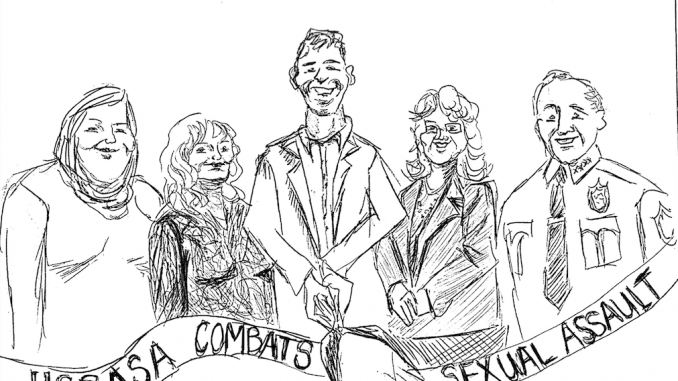
Last week, The New Paltz Oracle wrote about former USA Gymnastics and Michigan State osteopathic physician Larry Nassar and his 40 to 175 years in prison sentence for 10 counts of first-degree criminal sexual conduct. We also commented on the recent public discourse around the widespread sexual assault and harassment, saying that more needs to be done at all levels of society to prevent this type of abuse.
We at The New Paltz Oracle are proud to say that our own community has launched a ground-breaking program to educate local bar staff to prevent and intervene in potential incidences of sexual assault and harassment.
On Jan. 22, Ulster County Executive Mike Hein unveiled Ulster County Bystanders Against Sexual Assault (UCBASA). This program, facilitated by Ulster County Crime Victims (UCCV) Advocate and Enough is Enough coordinator Cynthia Craft and M.Ed., UCCV Advocate/Educator Sarah Kramer-Harrison, includes a two hour training to educate bar staff on certain behaviors they should recognize to determine if someone may be in danger and provide appropriate support.
This program is the first of its kind in New York State and will be launched in New Paltz with the assistance of of New Paltz Town Police Chief Joe Snyder and Mike Beck, president of the New Paltz Tavern Association. Staff of P&G’s Restaurant & Bar, Murphy’s Restaurant and Pub and McGillicuddy’s Restaurant & Taphouse, all three frequented by college students, received this training in the fall.
UCCV offers support and services for such victims and those of other violent crimes including preventative domestic violence. They also operate a 24-hour crisis hotline which can be reached at 845-340-3442. While these types of programs are important and vital to survivors, the creation of more programs like UCBASA is imperative.
According to Craft, although New Paltz is the pilot location for this program, the plan is that it will eventually encompass all of Ulster County.
“We want to help the bars in Ulster County to send a clear message that certain behaviors will not be tolerated and create a safe space for everyone,” she said.
There are similar bystander trainings available to the general public, but this is the first bystander intervention program geared specifically toward bar staff. Bars are meant to be an enjoyable social atmosphere, but it is an environment where alcohol is readily available thus creating potentially dangerous situations.
We as a society need to get away from the victim-blaming mentality that alcohol consumption leads to sexual assault. Alcohol only leads to sexual assault when a perpetrator is present to commit the crime. Although alcohol consumption may impair a victim’s ability to make decisions, we must also consider how alcohol also affects offender behavior if we are ever going to change a culture that actively supports and enables sexual assault.
The term “sexual assault” encompasses a wide range of offenses including verbal assault or harassment such as sexist jokes, cat calls, and threats to more violent unwanted sexual contact ranging from groping and forcible touching to rape. According to Rape, Abuse & Incest National Network (RAINN), the largest anti-sexual violence organization in the nation, among undergraduate students, 23.1 percent of females and 5.4 percent of males experience rape or sexual assault through physical force, violence or incapacitation.
There is no right or wrong way for an individual to react when they are subject to this type of violence. Everyones recovery process is different, but there are several symptoms that are common across victims including shock, disbelief or denial, sexual problems, feelings of loss of control, powerlessness, shame, guilt and self-blame, depression, fear, anger, flashbacks and nightmares and relationship problems.
According to the Center for Disease Control, 32,000 pregnancies are a result of rape every year, many times as a result of abusive relationships. Additional physical health risks associated with rape include chronic pain, gastrointestinal disorders, gynecological complications, migraines and frequent headaches, sexually transmitted infections, cervical cancer and genital injuries.
Instances of sexual violence can also have long-term social consequences for victims including strained relationships with family, friends and romantic partners, decreased emotional support from friends and family, decreased contact with friends and family, decreased likelihood of marriage and isolation or ostracism from one’s family and community.
Victims are also at higher risk of developing depression, anxiety disorders, post-traumatic stress disorder, loss of interest in or avoidance of sex and low self-esteem. They are also more likely to engage in high-risk sexual behavior, use of harmful substances, unhealthy dietary habits, criminal behavior and even self-harm or suicide.
No individual deserves to suffer a lifetime of trauma in exchange for another person’s moment of pleasure. One sexual assault is too many and we are grateful that our community for taking proactive measures to be prevent such a prevalent and serious problem.
